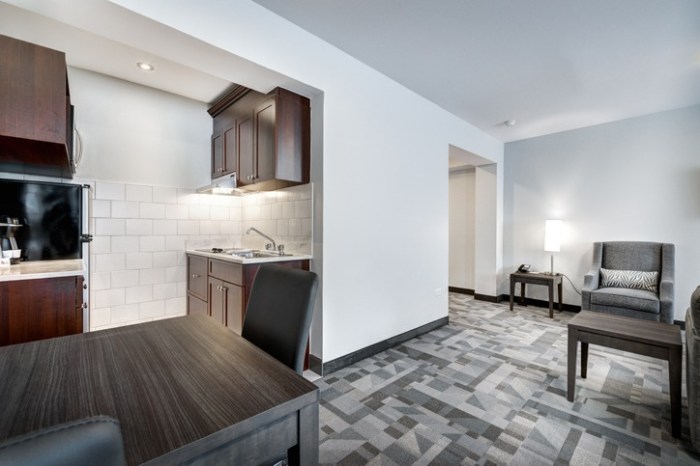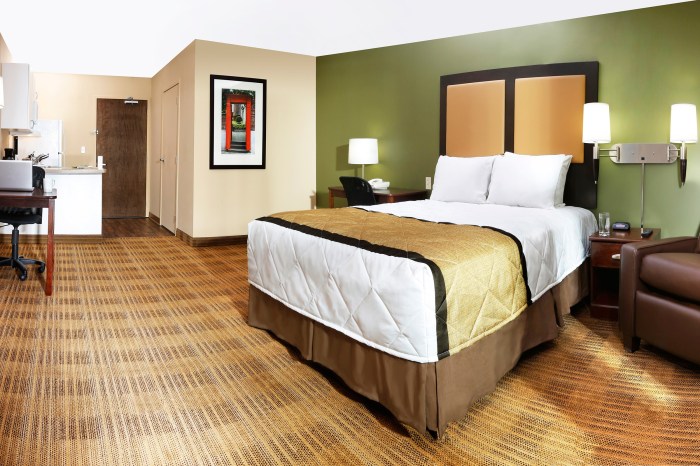Extended Stay Hotels A Comprehensive Guide
Extended Stay Hotels offer a unique lodging experience, bridging the gap between traditional hotels and long-term rentals. Unlike a typical hotel stay, extended stay options cater to guests needing accommodations for weeks or even months, providing a home-away-from-home feel with amenities designed for longer durations. This often includes kitchenettes or full kitchens, larger living spaces, and sometimes even laundry facilities, making them popular choices for business travelers on extended assignments, families relocating, or individuals undergoing temporary life changes.
This guide delves into the world of extended stay hotels, exploring their defining characteristics, target markets, pricing strategies, ideal locations, marketing approaches, competitive landscape, and future trends. We’ll examine how these hotels differ from traditional hotels and other lodging alternatives, providing insights into their unique appeal and the factors contributing to their success.
Defining Extended Stay Hotels

Source: lodgingmagazine.com
Extended stay hotels cater to a specific type of traveler: those needing accommodation for an extended period, typically a week or more. Unlike traditional hotels designed for shorter stays, these establishments prioritize comfort and convenience for longer-term guests. This translates into a different approach to amenities and services, creating a unique lodging experience.Extended stay hotels are characterized by larger accommodations than standard hotel rooms, often including kitchenettes or full kitchens, more living space, and often workspaces.
This contrasts sharply with traditional hotels which typically offer smaller rooms focused on sleeping and basic amenities. The extended stay model aims to provide a home-away-from-home experience, recognizing the needs of guests staying for a considerable length of time.
Key Characteristics Differentiating Extended Stay Hotels from Traditional Hotels
Extended stay hotels distinguish themselves through several key features. First and foremost is the size and functionality of the rooms. These accommodations are significantly larger than standard hotel rooms, offering more space for living, working, and relaxing. Secondly, the inclusion of kitchenettes or full kitchens is a defining characteristic. This allows guests to prepare their own meals, saving money and providing more control over their diet.
Finally, extended stay hotels often provide additional amenities tailored to longer stays, such as laundry facilities, ample workspace, and sometimes even fitness centers.
Amenities and Services Offered by Extended Stay Hotels
The amenities offered by extended stay hotels reflect their focus on long-term guests. Common features include fully equipped kitchens with refrigerators, stovetops, microwaves, and cookware. Many also offer laundry facilities within the hotel or in individual rooms, eliminating the need for frequent trips to laundromats. Extended stay hotels frequently provide larger workspaces, sometimes including desks and ergonomic chairs, suitable for those working remotely or needing a dedicated workspace.
Extended stay hotels are great for longer trips, offering more space and amenities than standard hotels. If you’re traveling with your furry friend, finding a place that welcomes pets is key, and luckily many extended stay options also cater to this; check out resources like Pet-Friendly Hotels to find the perfect fit. This ensures both you and your pet have a comfortable and enjoyable extended stay.
Some properties may also offer complimentary Wi-Fi, fitness centers, and on-site convenience stores.
Comparison of Extended Stay Hotels with Other Lodging Options
Extended stay hotels occupy a unique niche in the lodging market, offering a middle ground between traditional hotels and other options like apartments or serviced apartments. While apartments offer more space and kitchen facilities, they often lack the services and amenities provided by extended stay hotels, such as daily housekeeping (often offered at a higher rate) or 24-hour front desk assistance.
Serviced apartments provide a more luxurious and comprehensive service package, but generally come at a higher price point than extended stay hotels. Extended stay hotels strike a balance by providing a comfortable, functional space with essential amenities at a more accessible price.
Comparison of Three Major Extended Stay Hotel Brands
| Hotel Brand | Pricing (Approximate Average Nightly Rate) | Amenities | Target Market |
|---|---|---|---|
| Extended Stay America | $80 – $150 | Kitchenettes, free Wi-Fi, laundry facilities, fitness center (some locations) | Budget-conscious travelers, business travelers on extended assignments, relocation individuals |
| WoodSpring Suites | $70 – $120 | Full kitchens, free Wi-Fi, laundry facilities | Budget-conscious travelers, families, contractors, those needing temporary housing |
| Homewood Suites by Hilton | $120 – $200 | Full kitchens, free breakfast, free Wi-Fi, fitness center, outdoor pool (some locations) | Business travelers, families, those seeking more upscale amenities |
Target Market & Demographics
Extended stay hotels cater to a diverse clientele, but their primary target market centers around individuals and families requiring accommodations for longer durations than a typical hotel stay. This distinguishes them from traditional hotels, which primarily focus on shorter-term stays. Understanding the specific needs and motivations of these groups is key to their success.Extended stay hotels appeal to a broad demographic, encompassing both business and leisure travelers.
The length of stay, typically ranging from a week to several months, is the defining factor driving guest selection. This longer-term commitment requires a different approach to amenities and services compared to traditional hotels.
Business Travelers in Extended Stay Hotels
Business travelers represent a significant portion of extended stay hotel guests. These individuals often require accommodations for extended work assignments, project-based work, or temporary relocation. Their needs extend beyond a comfortable bed and Wi-Fi; they prioritize functionality and convenience. This includes amenities like well-equipped workspaces, reliable internet access, and often, kitchenettes for preparing meals, thus reducing reliance on expensive restaurant dining.
The cost-effectiveness of extended stay hotels compared to long-term apartment rentals or multiple hotel bookings is also a significant draw. For example, a consultant working on a three-month project in a new city would likely find an extended stay hotel more cost-effective and convenient than renting an apartment and furnishing it temporarily.
Leisure Travelers in Extended Stay Hotels
Leisure travelers also find extended stay hotels attractive, particularly those engaging in extended vacations, relocation, or those traveling with families. The availability of kitchenettes and laundry facilities allows for a more home-like experience, reducing the costs associated with daily restaurant meals and laundry services. Families, in particular, appreciate the extra space and the ability to prepare meals for children, contributing to a more comfortable and cost-effective vacation.
For instance, a family relocating across the country might choose an extended stay hotel for a month while searching for a permanent residence, allowing them to unpack, maintain some normalcy, and explore their new surroundings. The added space and home-like amenities reduce the stress of a major life transition.
Top Five Reasons for Choosing Extended Stay Hotels
Extended stay hotels offer several advantages over traditional hotels, making them a popular choice for many travelers. The following five reasons consistently top the list of guest preferences:
- Cost-effectiveness: Extended stay hotels offer significantly lower rates per night for longer stays compared to traditional hotels.
- In-room kitchenettes: The ability to prepare meals in the room saves considerable money on dining out.
- More space: Extended stay rooms typically offer more living space than standard hotel rooms.
- Laundry facilities: On-site or in-room laundry facilities eliminate the need for expensive laundry services.
- Home-like amenities: The combination of kitchenettes, laundry, and extra space creates a more comfortable and convenient stay.
Pricing and Revenue Strategies
Extended stay hotels employ diverse pricing strategies to maximize revenue and cater to the unique needs of their clientele, who often stay for weeks or months at a time. Unlike traditional hotels that primarily focus on nightly rates, extended stay properties leverage longer-term bookings to optimize profitability. Understanding these strategies is crucial for effective revenue management.
Pricing Models in Extended Stay Hotels
Extended stay hotels offer various pricing models to appeal to different budgets and lengths of stay. These models often incorporate discounts for longer stays to incentivize bookings. Common examples include weekly rates, which offer a discounted price per night compared to daily rates, and monthly rates, which provide even greater savings for extended stays. Some hotels also offer flexible packages combining weekly and monthly options depending on the guest’s needs.
For example, a guest might pay a discounted weekly rate for the first four weeks, then transition to a lower monthly rate for the remaining duration of their stay. This tiered approach encourages longer stays and fills rooms for extended periods.
Impact of Seasonal Fluctuations on Pricing
Seasonal demand significantly influences pricing strategies in extended stay hotels. During peak seasons, such as summer tourist months or periods of high corporate relocation, prices tend to increase to reflect the higher demand. Conversely, during off-seasons, hotels may offer discounts or promotional rates to attract guests and maintain occupancy levels. For example, an extended stay hotel near a popular beach destination might charge significantly higher weekly rates during the summer months, while offering substantial discounts during the colder winter months.
Effective revenue management involves carefully analyzing historical data to predict seasonal fluctuations and adjust pricing accordingly.
Extended stay hotels are great for longer trips, offering more space and amenities than standard hotels. If you’re traveling with kids, however, you might want to consider the extra features offered by Family-Friendly Hotels , which often include things like kids’ clubs and pools. But for longer stays, the convenience and value of extended stay options often outweigh other factors.
Revenue Management Strategies: Extended Stay vs. Traditional Hotels
Revenue management in extended stay hotels differs significantly from traditional hotels. Traditional hotels prioritize maximizing revenue per available room (RevPAR) on a daily basis, focusing on short-term bookings and optimizing occupancy rates. Extended stay hotels, however, place more emphasis on maximizing revenue per available roommonth* (RPM), considering the longer duration of stays. This involves forecasting long-term demand, managing inventory for extended periods, and employing strategies to encourage longer stays, such as loyalty programs and flexible booking options.
While both models utilize techniques like dynamic pricing and forecasting, the time horizons and key performance indicators differ considerably.
Hypothetical Pricing Structure: Example, Extended Stay Hotels
Let’s consider a hypothetical extended stay hotel in Austin, Texas. This location experiences seasonal variations in demand, with higher occupancy during the busy tech conference season (typically spring and fall) and lower occupancy during the summer months (due to heat) and winter holidays. A possible pricing structure could be:
| Season | Weekly Rate | Monthly Rate |
|---|---|---|
| Peak Season (Spring & Fall) | $1200 | $4000 |
| Shoulder Season (Early Spring, Late Fall) | $1000 | $3500 |
| Off-Season (Summer & Winter Holidays) | $800 | $2800 |
This structure incorporates higher prices during peak seasons to capitalize on high demand and lower prices during off-seasons to maintain occupancy. Competition from other extended stay hotels and traditional hotels in the area would also be a factor influencing these prices. The hotel could further refine this structure by offering additional discounts for longer stays (e.g., a 10% discount for stays exceeding three months) or bundled services (e.g., including internet and laundry in the monthly rate).
Location and Market Analysis

Source: optimisticmommy.com
Selecting the right location is paramount to the success of an extended-stay hotel. Factors beyond simple availability must be carefully considered to ensure a strong return on investment and high occupancy rates. This analysis explores key location characteristics and market dynamics influencing the profitability of extended-stay properties.Ideal locations for extended-stay hotels are characterized by a blend of accessibility, convenience, and demand.
Proximity to employment centers, transportation hubs, and desirable amenities significantly impacts guest selection and occupancy rates. Furthermore, a thorough understanding of the local competitive landscape and demographic trends is crucial for informed decision-making.
Ideal Location Characteristics
Extended-stay hotels thrive in areas offering easy access to employment opportunities. Proximity to major business districts, industrial parks, or hospitals is highly desirable. Convenient access to public transportation, such as bus routes, subway lines, or nearby airports, also increases appeal to guests who may not have personal vehicles. The presence of local amenities, such as grocery stores, restaurants, fitness centers, and parks, further enhances the appeal and convenience for extended-stay guests.
Finally, a safe and well-maintained surrounding neighborhood contributes significantly to guest satisfaction and repeat bookings.
Market Demand in Urban vs. Suburban Areas
Urban areas typically boast higher demand for extended-stay hotels due to the concentration of business travelers, relocating individuals, and those requiring temporary housing near urban employment centers. However, competition is also significantly higher in urban settings, often resulting in more aggressive pricing strategies. Suburban areas, on the other hand, might present lower demand but also less competition, potentially offering higher profit margins with strategic marketing targeting specific demographics like families relocating or those seeking temporary housing near suburban employment hubs.
The success in either location depends heavily on a well-defined target market and effective marketing strategies.
Visual Representation of a Desirable Location
Imagine a three-story extended-stay hotel situated near a major highway interchange, with easy access to both a thriving business district and a suburban residential area. The hotel is within walking distance of a grocery store, several restaurants, and a fitness center. A nearby park provides a green space for relaxation and recreation. The surrounding neighborhood is characterized by well-maintained residential areas, creating a sense of safety and community.
Extended stay hotels are great for longer trips, offering more space and amenities than standard hotels. If you’re looking for a good deal, many extended stay options also include perks like a complimentary breakfast; for example, check out this list of hotels offering Hotel with Free Breakfast to see if they fit your needs and budget. Ultimately, the best choice depends on the length of your stay and your personal preferences, but free breakfast is always a nice bonus.
The hotel itself features ample parking, and the highway access allows for quick and convenient commutes to various parts of the city. This location caters to both business travelers seeking proximity to work and families needing temporary accommodation while relocating or undergoing home renovations. This strategic positioning minimizes commute times and maximizes access to essential amenities, leading to high guest satisfaction and occupancy rates.
Extended stay hotels are great for longer trips, offering kitchenettes and more space than typical hotels. If you’re looking for a more stylish and personalized experience during your extended stay, however, you might consider the unique charm offered by Boutique Hotels , although they typically cater to shorter stays. Ultimately, the best choice depends on your priorities for comfort and convenience during your trip.
Marketing and Branding
Effective marketing and branding are crucial for extended stay hotels to attract and retain guests in a competitive market. A strong brand identity, coupled with targeted marketing campaigns, can significantly impact occupancy rates and revenue. This section will explore various marketing strategies and branding approaches specific to the extended-stay sector.
Effective Marketing Campaigns for Extended Stay Hotels
Extended stay hotels cater to diverse groups, each requiring a tailored marketing approach. For example, business travelers often prioritize convenience and connectivity, while families may focus on amenities and value. Marketing campaigns should reflect these varying needs.
- Business Travelers: Campaigns could highlight features like high-speed internet, business centers, and proximity to corporate offices. Marketing materials might include targeted ads on LinkedIn and professional websites, partnerships with corporate travel agencies, and email marketing campaigns focusing on corporate rates and loyalty programs. An example campaign might feature testimonials from satisfied business travelers showcasing the hotel’s efficient workspace and reliable connectivity.
- Families: Marketing should emphasize family-friendly amenities such as kitchens, spacious suites, laundry facilities, and nearby recreational activities. Campaigns could utilize social media platforms like Facebook and Instagram, showcasing family-friendly activities and positive guest reviews. A successful campaign might involve partnering with local family-oriented businesses to offer bundled packages or discounts.
- Relocation Guests: For those relocating, extended-stay hotels offer a temporary home. Marketing should focus on the convenience of fully equipped apartments, the sense of community, and flexible lease options. Strategic partnerships with relocation companies and real estate agents could drive bookings. A compelling campaign might highlight the ease of transition and the support services offered to make relocation smoother.
Online Reputation Management for Extended Stay Hotels
Online reviews significantly influence booking decisions. Positive reviews build trust and attract new guests, while negative reviews can deter potential customers. Effective online reputation management involves actively monitoring online platforms like TripAdvisor, Google Reviews, and Booking.com, responding promptly to both positive and negative feedback, and proactively addressing any issues raised. A strong online reputation is essential for maintaining a positive brand image and driving bookings.
Failing to manage online reputation can lead to decreased occupancy and negative word-of-mouth marketing.
Branding Strategies of Different Extended Stay Hotel Chains
Different extended-stay chains employ diverse branding strategies to target specific market segments. Some emphasize value and affordability, while others focus on upscale amenities and a more luxurious experience. For example, some brands might focus on a homely and comfortable feel, while others might project a more modern and stylish image. Analyzing these strategies reveals different approaches to brand positioning and target market identification.
Extended Stay America, for instance, focuses on affordability and practicality, while other chains might highlight more sophisticated amenities and services, positioning themselves as a premium extended-stay option.
Marketing Plan for a New Extended Stay Hotel
This plan targets business travelers and families in a suburban location near a major employment hub and family-friendly attractions. Target Audience: Business travelers requiring temporary housing for project work, and families needing temporary accommodation due to home renovations or relocation. Messaging: “Your Home Away From Home: Comfort, Convenience, and Value.” This message emphasizes the hotel’s amenities, location, and competitive pricing.
Channels:
- Digital Marketing: Website optimization, search engine marketing (SEM), social media marketing (targeting relevant demographics on Facebook, Instagram, and LinkedIn), and email marketing campaigns.
- Partnerships: Collaborating with local businesses, relocation services, and corporate travel agencies to drive referrals.
- Public Relations: Press releases announcing the hotel opening and highlighting its unique features and amenities.
- Traditional Marketing: Local print advertising in community newspapers and magazines, and potentially billboards or signage near the hotel and major thoroughfares.
Competition and Differentiation: Extended Stay Hotels
The extended-stay hotel market is increasingly competitive, with established brands and new entrants vying for market share. Understanding the competitive landscape and effectively differentiating a new hotel are crucial for success. This requires a deep dive into competitor analysis, a clear identification of unique selling propositions, and a well-defined marketing strategy.Successful extended-stay hotels stand out by offering a compelling combination of value, convenience, and amenities tailored to the needs of long-term guests.
This goes beyond simply providing a room; it’s about creating a comfortable and functional home-away-from-home environment.
Main Competitors in the Extended Stay Market
Major competitors in the extended-stay hotel sector often include established brands like Extended Stay America, WoodSpring Suites, Residence Inn by Marriott, and Homewood Suites by Hilton. These brands compete on various factors, including price point, location, amenities, and brand reputation. Smaller, independent extended-stay hotels also exist and compete primarily on localized pricing and personalized service. The specific competitive landscape varies significantly by geographic location and market saturation.
For example, in a densely populated urban area, competition might be fierce among numerous brands, while a smaller town might only have a few options, including independent hotels.
Key Differentiators for Successful Extended Stay Hotels
Several key factors differentiate successful extended-stay hotels. These include superior location and accessibility, offering convenient access to transportation, businesses, and local amenities. Another critical factor is the provision of comfortable and well-equipped rooms and suites, featuring amenities like full kitchens, ample workspace, and high-speed internet. Exceptional customer service, personalized attention, and a focus on building relationships with long-term guests also set successful hotels apart.
Finally, competitive pricing and flexible booking options are essential to attract and retain guests.
Comparison of Services and Amenities Offered by Different Brands
Extended Stay America typically focuses on budget-friendly options with basic amenities, while Residence Inn by Marriott and Homewood Suites by Hilton offer more upscale accommodations with a wider range of amenities, including complimentary breakfast and fitness centers. WoodSpring Suites occupies a middle ground, providing a balance between affordability and amenities. The differences often come down to the level of service, the quality of furnishings, and the included amenities.
For instance, some brands offer complimentary laundry facilities, while others charge for this service. Similarly, the quality and variety of complimentary breakfast offerings can differ significantly across brands. This comparison highlights the importance of identifying a specific niche and catering to a particular guest profile.
Differentiation Strategies for a New Extended Stay Hotel
A new extended-stay hotel can differentiate itself through several strategies. One approach is to focus on a specific niche market, such as business travelers, families, or medical professionals, tailoring amenities and services to meet their unique needs. Another strategy involves offering unique amenities not commonly found in competing hotels, such as a dedicated co-working space, on-site childcare, or a pet-friendly environment with enhanced pet amenities.
Furthermore, leveraging technology to improve the guest experience, through features like mobile check-in/check-out, digital key access, and personalized in-room entertainment options, can create a significant point of differentiation. Finally, establishing strong partnerships with local businesses and attractions can provide added value and enhance the guest experience. For example, a partnership with a local gym could offer guests discounted membership rates.
Extended stay hotels are perfect for longer trips, offering amenities like kitchenettes and more space. If your extended stay involves a flight, finding a hotel near the airport is key, and you can easily search for options using this helpful site: Hotels Near Airport. Many extended stay hotels are conveniently located near airports, making travel planning a breeze.
Future Trends in the Extended Stay Hotel Industry
The extended stay hotel market is poised for significant growth, driven by evolving travel patterns and technological advancements. Factors like the rise of remote work, the increasing popularity of “bleisure” travel (blending business and leisure), and a growing preference for longer-term accommodations are all contributing to this expansion. This section will explore several key trends shaping the future of the extended stay hotel industry.
Growth Projections and Market Expansion
The extended stay hotel sector is expected to experience robust growth in the coming years. Several factors are contributing to this positive outlook. The increasing number of individuals working remotely, needing temporary housing near their work locations, or seeking extended vacations are boosting demand. Furthermore, the rise of the “gig economy” and the increasing mobility of the workforce also contribute to this trend.
For example, companies like Airbnb have already demonstrated the high demand for extended-stay accommodations, and traditional hotels are adapting their offerings to compete in this growing market. Analysts predict a compound annual growth rate (CAGR) exceeding 5% in many key markets globally over the next decade.
Technological Integration and Enhanced Guest Experience
Technology is rapidly transforming the extended-stay hotel experience. Smart room technology, including automated lighting, temperature control, and integrated entertainment systems, is becoming increasingly common. Mobile check-in/check-out, keyless entry systems, and personalized in-room experiences through smart devices enhance convenience and guest satisfaction. Furthermore, the integration of high-speed internet and robust Wi-Fi networks is crucial for remote workers and those needing reliable connectivity.
Consider the example of hotels implementing voice-activated assistants in rooms to control appliances and request services, offering a seamless and modern experience.
Sustainability and Eco-Conscious Initiatives
Growing environmental awareness is driving the adoption of sustainable practices within the extended stay hotel industry. Hotels are increasingly focusing on energy efficiency through measures like installing energy-efficient appliances and lighting, optimizing HVAC systems, and utilizing renewable energy sources. Water conservation initiatives, such as low-flow showerheads and water-saving toilets, are also gaining traction. Waste reduction programs, including recycling initiatives and composting programs, are becoming standard practice.
For example, some extended-stay chains are implementing comprehensive sustainability programs, earning certifications like LEED (Leadership in Energy and Environmental Design), showcasing their commitment to environmental responsibility and attracting environmentally conscious guests.
Three Potential Future Trends
The extended stay hotel market will continue to evolve, driven by various factors. Here are three potential future trends:
The rise of “micro-living” concepts within extended-stay hotels will cater to the growing demand for compact, affordable, and well-designed spaces. This will involve creating efficient and functional rooms with smart storage solutions and multi-purpose furniture.
Increased personalization and customization of extended-stay packages will become increasingly prevalent, allowing guests to tailor their stay to their specific needs and preferences. This may involve options for flexible lease terms, customized room configurations, and curated local experiences.
The integration of co-working spaces and community areas within extended-stay hotels will further blur the lines between work and leisure, offering guests a flexible and productive environment. This will create a sense of community among residents, fostering collaboration and networking opportunities.
Wrap-Up
The extended stay hotel industry presents a dynamic and evolving landscape. From understanding the diverse needs of their clientele to adapting to technological advancements and sustainability concerns, these hotels are continuously innovating to meet the changing demands of travelers. By focusing on strategic location, competitive differentiation, and effective marketing, extended stay hotels are poised for continued growth and success in the hospitality sector.
Ultimately, their ability to provide a comfortable and convenient home-away-from-home experience for extended stays remains their key to success.
User Queries
What are the typical lengths of stay at an extended stay hotel?
While it varies, stays typically range from a week to several months.
Are pets allowed in extended stay hotels?
Pet policies vary significantly between hotel chains and individual locations. It’s always best to check directly with the hotel before booking.
Do extended stay hotels offer discounts for longer stays?
Yes, many extended stay hotels offer discounted weekly or monthly rates to incentivize longer bookings.
What are the cancellation policies like?
Cancellation policies vary; always review the specific policy of your chosen hotel before booking. Longer stays often have different cancellation rules than shorter ones.
Are extended stay hotels suitable for families?
Many extended stay hotels cater to families with amenities like kitchenettes, extra space, and sometimes even laundry facilities, making them a convenient option for family travel.







